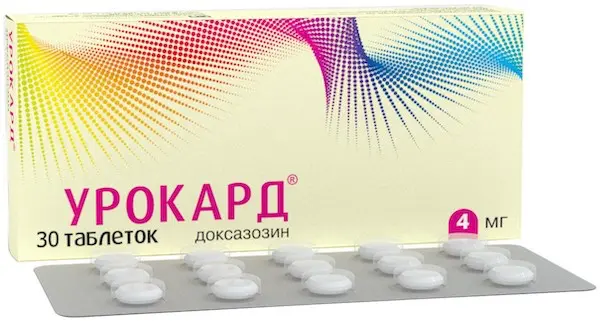Description
Urocard Pharmacodynamics
Doxazosin is a selective competitive blocker of postsynaptic alpha1-adrenoreceptors (affinity for alpha1-receptors is 600 times higher than for alpha2), reduces total peripheral vascular resistance, prevents vasoconstriction caused by catecholamines, which ultimately leads to a decrease in blood pressure (BP) without development of reflex tachycardia. Reduces pre- and post-load. After a single oral administration the BP reduction develops gradually, the maximum effect develops in 2-6 h. and lasts for 24 h.
In patients with arterial hypertension, BP during treatment with the drug was the same in the “standing” and “lying” position.
Effective in arterial hypertension; including those accompanied by metabolic disorders (obesity, decreased glucose tolerance).
Reduces the risk of coronary heart disease. Administration of the drug in patients with normal blood pressure is not accompanied by a decrease in BP. When doxazosin is used for a long time, patients develop tolerance.
During doxazosin treatment, a decrease in plasma concentration of triglycerides and total cholesterol is observed. At the same time, some increase (by 4 -13%) of high density lipoproteins/total cholesterol ratio is observed. During long-term treatment with doxazosin there is regression of left ventricular hypertrophy, suppression of platelet aggregation and increased plasminogen activity in tissues. Due to the fact that doxazosin blocks alpha1-adrenoreceptors located in the stroma and capsule of the prostate and in the bladder neck, there is a decrease of resistance and pressure in the urethra, reduction of internal sphincter resistance. Therefore, doxazosin application in patients with symptoms of benign prostatic hyperplasia (BPH) leads to significant improvement of urodynamic parameters and reduction of manifestations of the disease symptoms. It has an effect in 66 – 71 % of patients, the beginning of action – after 1-2 weeks of the treatment, maximum – after 14 weeks, the effect lasts for a long time.
Indications
Benign prostatic hyperplasia: both in the presence of arterial hypertension and normal BP.
Arterial hypertension: in combination with other hypotensive agents, such as thiazide diuretics, beta-adrenoblockers, slow calcium channel blockers (SCBs) or angiotensin-converting enzyme inhibitors (ACE).
Contraindications
Hypersensitivity to doxazosin, other quinazoline derivatives or to any of the excipients of the drug.
Age under 18 years (efficacy and safety have not been established).
Lactose intolerance, lactase deficiency or glucose-galactose malabsorption.
Caution:
In patients with impaired liver function, mitral and aortic stenosis, with a tendency to arterial hypotension (orthostatic circulatory disorders).
Pregnancy and lactation:
To date, there is insufficient experience with doxazosin in patients with arterial hypertension during pregnancy and lactation. Therefore, despite the absence of teratogenic and embryotoxic effects according to experimental studies, Urocard may be used during pregnancy and during lactation only after careful weighing by the physician of the benefit/risk ratio for the mother and the risk for the fetus/infant.
Dosage and administration
- Tablets should be taken once a day (morning or evening), regardless of meals, without chewing and with plenty of water.
- In the treatment of benign prostatic hyperplasia, the initial dose is 1 mg/day (1/2 tablet of 2 mg) to minimize the possibility of orthostatic hypotension and/or fainting. If necessary, depending on urodynamic parameters and the presence of symptoms of BPH, increase the dose (at intervals of 1-2 weeks) to 2-4 mg/day. The maximum tolerated dose is 8 mg per day. The recommended maintenance dose is 2-4 mg/day.
- When treating patients with arterial hypertension, the initial dose of the drug, is 1 mg (1/2 tablet of 2 mg) daily before bedtime. After the first dose, the patient should stay in bed for 6-8 hours. This is required due to the possibility of development of “first dose” phenomenon, especially pronounced against the background of previous diuretics intake.
- If the therapeutic effect is insufficient, the daily dose may be increased to 2 mg after 1-2 weeks. Thereafter, every 1-2 weeks the dose may be increased by 2 mg. In the vast majority of patients, the optimal therapeutic effect is achieved at a dose of 8 mg per day. The maximum daily dose of the drug of 16 mg per day’ should not be exceeded. After achieving a stable therapeutic effect, the dose is usually reduced (the average therapeutic dose for maintenance therapy is usually 2-4 mg per day).
- Urocard is taken for a long time. Duration of treatment shall be determined by the physician.










